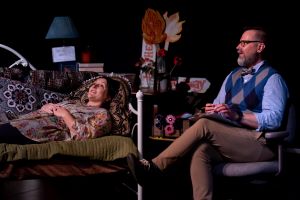Pianist Greg McCallum has garnered considerable praise over the years – he’s an active and engaged artist who is heavily involved in many causes beyond his superior musicianship. He’s just returned from France, where he immersed himself in music, and his playing during his first post-trip concert was exceptional in every respect.
The Triangle Brass Band is one of our best regional ensembles – it’s a professional-grade group of all-stars, directed by our leading bandmaster, Michael Votta, who has honed it to razor-sharp precision. And thanks to this conductor and the TBB and his other fine ensembles (including the NC Wind Orchestra), we’ve learned a lot about music for bands and come to realize that there’s a vast amount of worthwhile literature out there that mainline “classical” people – folks who limit their concert-going to orchestral and chamber music programs – know only peripherally, if at all.
Partnerships – and “outreach” – are all the rage, thanks in part to the game of grantsmanship, the interest of some funders in “diversity” (whether or not the ensembles routinely mirror it), and the ever-present need to attract “new audiences.” So it should come as no great surprise that this fine pianist and this fine band teamed up for a concert. Given the program, however, partisans of the pianist and the band – and of both band and classical music – must surely have thought this a somewhat strange lash-up.
That said, the partners come by their passion for this sort of thing honestly, and it was no flash in the pan. McCallum has long sought to merge musics of diverse origins, and his own compositions – one of which figured in this program – and his recordings, too, have been wildly successful. He’s a stellar pianist with a heart and soul that are as immense as his talent. And the band has given (or participated in) some exceptional performances of major scores that few other groups have undertaken here.
With that brief background, we turn to the program presented at the Bible Church on October 14, when there were many competing music offerings on the calendar. For openers, there was heavy security outside the venue – two uniformed officers kept watch on the assembling patrons. The venue – which served as the NC Symphony’s Chapel Hill home-away-from-home while Memorial Hall was undergoing renovation – is hospitable for music, and it’s large enough for a band to sound just fine, at all volume levels, without overwhelming the listeners. The program began with a saucy arrangement of the Overture to Rossini’s Barber of Seville – cartoon music for some, but a worthy piece that, even in this guise, received a reading totally in keeping with the composer’s intent in terms of tempo and sculpted dynamics. There were some minor glitches in ensemble as the players warmed to the task, and the finale didn’t sound at all familiar in this (uncredited) arrangement, but the performance was well received. So, too, were probing readings of three Debussy preludes, played by McCallum with fresh insight and palpable emotion. There was a large-screen TV on which the pianist’s hands were projected from over his right shoulder, so everyone could watch as he spun his impressionistic magic.
Next up was McCallum’s Hymn Quilt (1998), a substantial offering from his recent Southern Quilt CD that was enhanced by a display of numerous quilts in the sanctuary. This is nominally a solo-piano pastiche that encompasses old hymn tunes, many of which have been mined by other composers and arrangers. The audience joined in singing verses from “Amazing Grace,” and the TBB enriched “A Mighty Fortress” with rich low-brass commentary, after which McCallum left the stage as Votta’s forces delivered a rousing performance of Jan Van der Roost’s “Mercury March,” a repertory staple that turned out to be the band’s only “straight” work offered on this occasion.
The second half of the concert was devoted to a performance of Grieg’s celebrated Piano Concerto in A Minor, one of the great “Romantic” warhorses, although it no longer turns up in concerts as often as it once did. It was concurrently the evening’s chief and most controversial attraction, and I must ‘fess that it has taken me a lot longer to come to terms with this rendition than I’d anticipated. Indeed, it took three days of pondering – and a glowing, impassioned reading of Grieg’s Cello Sonata (by Bonnie Thron and Antonio Pompa-Baldi – reviewed by our colleague Roy C. Dicks) – before the obvious issue finally dawned on me: what was missing in Chapel Hill was strings. That was readily apparent, of course, but this arrangement – not credited in the program, and said to have been the work of several hands – worked surprisingly well, for the most part, and the overall quality of the playing led one to think that it was a basically-ok version. The instrumental work by all concerned was good, and Votta ensured excellent balance with McCallum, who could easily have been inundated, but wasn’t. The solo work was exceptional, insightful, varied, and consistently appealing, and the soloist and conductor watched each other like hawks at all the crucial points. The overall sonority was rich and full, and the low brass instruments, in particular, sounded as radiant as a great pipe organ, bringing to mind a comment once applied to the NCWO that is appropriate here – bands are basically large, multi-player wind (or brass) organs. But what was missing was the sonority and texture that is usually imparted to this famous Concerto by strings – and in retrospect it was that lack that made this performance a curiosity instead of a completely satisfying musical experience.











